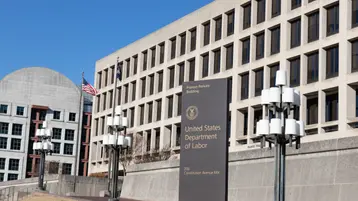

Department of Labor (DOL) audits are becoming more common and onsite visits of businesses, which came to a halt during the height of the COVID-19 pandemic, are starting up again. Here’s what business owners should know about DOL investigations.
The Labor Department conducts audits to determine if businesses are complying with federal laws and regulations. However, some audits are follow-up inspections to see if past violations have been corrected. The DOL’s most common audit is conducted by its Wage and Hour Division (WHD). WHD auditors check for compliance with the Fair Labor Standards Act (FLSA). The FLSA requires that workers receive a minimum wage and overtime pay, among other things.
Most audits take a few weeks or months. The process involves government investigators examining employer records and conducting employee interviews. DOL investigators may also conduct a virtual or physical visit to the workplace. The auditors will use this information to see if violations have occurred.
The process involves government investigators examining employer records and conducting employee interviews.
At the end of the investigation, there is a closing conference. The auditor will walk through the investigation findings and discuss violations and penalties, according to Kathleen McLeod Caminiti, an attorney in the New Jersey/New York offices of Fisher Phillips. The findings can be appealed. Often there is a compliance agreement between the employer and the Labor Department. But, if there is no agreement, either the Labor Department or the employer can file a lawsuit.
No. Employers generally receive advance notice of an investigation, but sometimes federal compliance investigators show up with no warning. When provided with notice, employers usually have 72 hours to respond.
The most common reason for employers coming up on the DOL’s radar is because of complaints by current or former employees. Also, certain industries are “hot spots” for audits, Caminiti said.
Caminiti said DOL examiners are currently focused on several “hot spots,” such as:
Handling an audit begins before government investigators show up. Kristina Brooks, an attorney with the Albuquerque, New Mexico office of Jackson Lewis P.C., said the most important thing that employers can do is to plan in advance for a DOL investigation. Brooks worked for the Labor Department for 16 years. Brooks said employers should:
Pre-planning should also include periodic internal compliance reviews. Brooks suggested that employers conduct a self-audit aimed at looking for things that the company is doing wrong. Check for “low-lying fruit” such as posters, Brooks said. Caminiti said the internal compliance review should be done with the advice of counsel because (1) lawyers know what the Labor Department is looking for and (2) attorney-client privilege will apply, Caminiti said. The last thing that a business needs is to do a non-privileged compliance review that identifies issues because gathering that information and identifying those issues can expose a business to penalties if there is an audit, Caminiti said
When employers receive a notice of a DOL investigation, they should take it seriously. “Don’t ignore it,” Caminiti said. First, employers should determine if investigators should be there in the first place. Small business owners should be aware of the FLSA’s jurisdictional threshold, Caminiti said. While the FLSA does not have a requirement of a minimum number of employees, the federal law does have a minimum of $500,00 in gross sales. The investigator might not know that, Caminiti said. Second, request that they reschedule the investigation. Employers can ask that investigators conduct the audit at another time, Caminiti said. Brooks also suggested that employers under investigation call the auditor to find out the scope of the investigation, the period of time the investigation covers, and the documents that they must provide. If investigators show up unannounced, employers can ask that they wait or negotiate another day to return, Brooks said. Any time an agency shows ups for an investigation, you should ask for an attorney to be present, Brooks said, adding that employers often fail to call a lawyer. Third, try to narrow the scope of the investigation, Brooks said. There’s nothing wrong with asking that it cover a smaller period of time, she added. In the meantime, Caminiti said, employers should “reach out to stakeholders — departments such as finance and HR — so that business records can be presented properly.” Organize the records to see if there are any concerns, Caminiti said.
Investigators may want to talk to employees. Employers should teach employees their rights, Brooks said. Employers can provide employees with the basics of what to expect from an investigator interview and workers can be told they don’t have to talk to the auditors. Employees can also ask about the purpose of the questions, Brooks said. The agency can talk to non-managers in private. However, a company manager can sit in on a manager interview. In addition, employers can’t require that employees debrief them after the agency interview. After the interview, government investigators will provide an individual statement for the employee to sign. Employees should be told that they are allowed to read the individual statement before they sign it, and they don’t have to sign it.
Employers should make copies for their records of everything they provide investigators.
“The investigators are people,” Caminiti said, advising that employers should be “polite, responsive and cooperative.” “Be honest,” Caminiti said. If you need extra time, let the investigators know.
Many employers don’t understand the laws that apply to them and their payroll practices, Brooks said. Understand how the laws interplay, Brooks said, adding that with some of the regulations and standards enacted over COVID-19, there were times when county laws had to be considered. The Labor Department takes their mission seriously, especially the Wage and Hour Division. Businesses should evaluate their level of compliance and make sure things are in order before they find out they are under investigation.